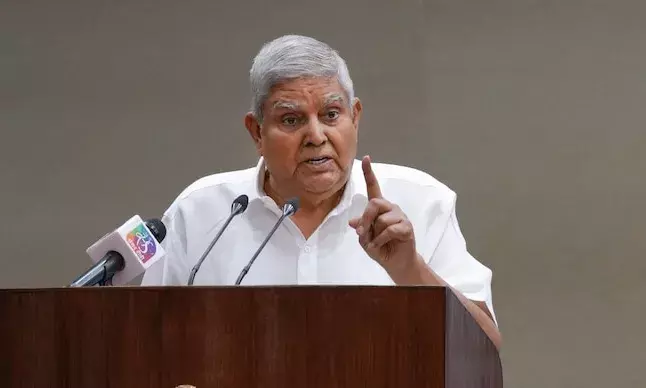Vice President Dhankhar Criticizes Supreme Court for Acting as "Super Parliament"
Claims Article 142 Has Become a "Nuclear Missile Against Democratic Forces" After Court Sets Presidential Bill Approval Timeline;

Vice President Jagdeep Dhankhar on Thursday questioned the Supreme Court's decision, which said that the President should take a decision on any bill sent by the states within the prescribed time limit. Questioning this attitude of the court, Vice President Dhankhar said that the court cannot act as a 'super parliament'.
Along with this, he said that Article 142 of the Constitution has become a 'nuclear missile' for the court against democratic forces. Dhankhar made this strong comment towards the judiciary while addressing the Rajya Sabha trainees.
Just a few days ago, the top court had set a deadline for the President's approval on the bills sent by the Governor for the President's consideration. He said, "We have judges who will make laws, who will do the work of the executive, who will act as a super parliament and they will have no accountability, because the law of the country does not apply to them."
He said, "Article 142 has become a nuclear missile against democratic forces and (which) is available to the judiciary 24 hours a day."
In such a situation, the question arises that what is this Article 142? Actually, the Constitution of India under Article 142 gives the Supreme Court the power to give any direction, order or decision to do complete justice, no matter who the case is related to. The Constitution states that using the powers and authority of this article, the Supreme Court can pass such a decree or give such an order which is necessary to ensure complete justice in any case or cases pending before it. This order will be applicable to the whole country.
Apart from this, under the powers obtained from this article, the Supreme Court can call any person before it or call for necessary documents. If someone disobeys this, then an investigation can be conducted against him and he can also be punished. Using this power, the Supreme Court overturned the results of the Chandigarh Mayor election in January this year.
What is Article 142
Article 142 of the Indian Constitution grants the Supreme Court a unique and expansive power to ensure "complete justice" in any case or matter pending before it. This provision empowers the Court to pass any decree or make any order necessary to do complete justice, even if such orders go beyond the scope of existing laws. The orders passed under Article 142 are enforceable throughout India, ensuring uniformity and effectiveness. The Article serves two primary purposes: to fill legislative gaps where laws may be inadequate or absent, and to provide comprehensive justice in individual cases. However, the exercise of this power is subject to important limitations—it cannot override constitutional provisions, violate substantive rights of non-parties, or contravene principles of natural justice. Over the years, Article 142 has enabled the Supreme Court to act decisively in landmark matters such as the Bhopal gas tragedy compensation, workplace sexual harassment guidelines, and public interest interventions, reflecting its role as the guardian of the Constitution and a catalyst for judicial activism. Despite its broad scope, judicial restraint is advised to prevent overreach, maintaining a balance between equity, law, and constitutional mandates.

